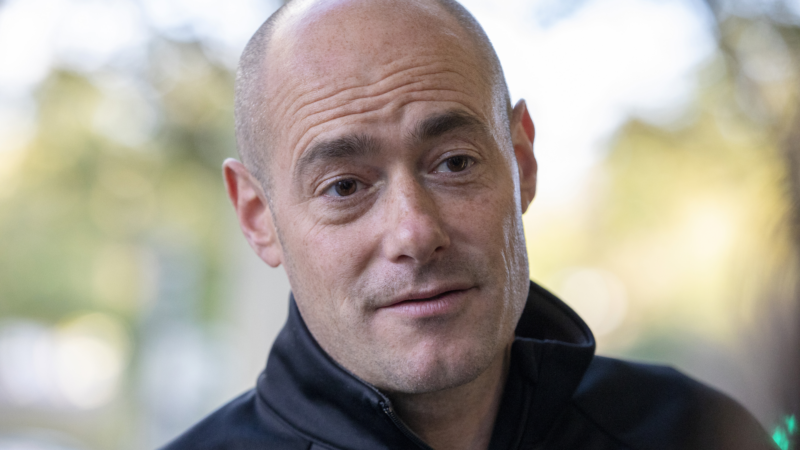Trump admin. cuts funding for program that tracked Ukrainian children abducted by Russia
Funding for a U.S.-based program that tracks thousands of Ukrainian children allegedly abducted and taken to Russia has been cut and U.S. lawmakers are worried that a database with crucial information has been permanently deleted, according to a letter to Secretary of State Marco Rubio signed by more than 15 lawmakers.
“This data is absolutely crucial to Ukraine’s efforts to return their children home …The foreign aid freeze has jeopardized, and may ultimately eliminate, our informational support of Ukraine on this front,” the letter states.
In an email to NPR on Wednesday, a Yale University spokesperson acknowledged that funding for the Yale School of Public Health Humanitarian Research Lab (HRL)’s work on the war in Ukraine, which included the research on the abducted children, has been “discontinued.”
“While we are not in a position to comment on the State Department’s decision, we do recognize the importance of HRL’s work and its contributions to international efforts to protect vulnerable populations, including Ukrainian children,” the statement said.
One of the lawmakers behind the letter to Rubio is Rep. Greg Landsman, a Democrat from Ohio. He spoke with NPR All Things Considered‘s Ailsa Chang.
“The data is really important because in order to get the kids back, folks at the negotiating table have to be able to say, ‘We know where these children are,'” Landsman said. “So without this data, there’s real concern that we might not be able to get all of these children back.”
On Wednesday, State Department spokesperson Tammy Bruce said the allegation of missing data is false. “We know who is running the data and we know fully that the data exists and it’s not been deleted and it’s not missing.”
In a statement regarding President Trump’s Wednesday morning phone call with Ukrainian President Volodymyr Zelenskyy, Rubio said the two leaders discussed “the children who had gone missing from Ukraine during the war, including the ones that had been abducted. President Trump promised to work closely with both parties to help make sure those children were returned home.”
This interview has been lightly edited for length and clarity.
Interview highlights
Alisa Chang: The Trump administration has ended its funding of the Ukraine Conflict Observatory, which is housed at Yale University’s Humanitarian Research Lab. Can you just very briefly explain what exactly does this group do?
Greg Landsman: So, they track these children in a way that’s independent and can be used ultimately to get them home. And you’re talking about demographic information, names, confirmation of the fact that they were stolen, where they were taken from and then using satellite data where they are now.
Chang: And why do you think it’s specifically in the interest of the U.S. to fund this kind of work?
Landsman: Well, we have been a partner, obviously, in trying to get Putin out of Ukraine and trying to protect Eastern Europe. And we have invested a lot in the Ukrainian people. One of the things that stood out for me over the course of the last couple of years was what was happening to these children. In addition to the awfulness of war and the casualties that Putin was stealing children — and in the process of looking for the data to confirm that, in fact, we had the right numbers and we were using the right information — we learned that the database disappeared and it disappeared because they cut funding for the work.
Chang: Can we talk a little bit more about this database, like exactly what kind of information has been uncovered and is part of this database? And how does that information help Ukrainians get these children back home?
Landsman: The Ukrainians wanted an independent, third-party capable entity that was run through the State Department to verify the names and [verify that] the children were still alive and to be able to use satellite information to track the children so that we didn’t lose them. And when the war comes to an end — and hopefully, we’re getting there — that any ceasefire agreement would involve the return of the children. And so, it’s a lot of demographic data and a lot of satellite information that we now can’t find.
Chang: The State Department has confirmed that they did cancel the contract to fund the Ukraine Conflict Observatory. Have you gotten any reasons as to why, specifically?
Landsman: Just the quote from one of the administrators over there who said that it was part of saving money but doesn’t save any money. The money had been spent. And even if it was something that, you know, should have been looked at, I don’t think there’s an American Republican, Democrat, independent who would want to see us give up on these children.

Chang: If it is true, that this data from the repository has been deleted, even permanently deleted — can you talk about what would be the impact of no longer having this information?
Landsman: It’s the difference between showing up to a negotiation with a list of all the names and locations and not having any list at all. And so, the impact could be…
Chang: There’s no other source for this information. The location of the whereabouts of these children.
Landsman: [It is] our understanding that this is the primary, if not, this is the only source.
Chang: If you believe the data was permanently deleted, as the letter you sent indicates, do you have any reason to believe that the data is recoverable at this point?
Landsman: We’ve heard from some folks that are close to the project that it is possible to retrieve the data. So, my hope is that’s what ends up happening. The only thing that matters is getting these kids home.
Chang: Well, given the direction currently of ceasefire talks between Russia, the U.S. and Ukraine to end this war, how hopeful are you that this particular issue of child abductions is getting the attention it deserves in the middle of all the talks?
Landsman: So far, I’ve been really disappointed that it hasn’t been front and center. If somebody stole one American child, you know, we would want that to be top of mind. We would want it to be at the top of the list. And it probably would be, you’re talking about 30,000 confirmed children stolen from their families. And it shouldn’t even be negotiated. They should just be returned. I hope to see in the coming days and weeks this as a top priority for the administration.
As noted earlier, State Department spokesperson Tammy Bruce said the data exists and “it’s not been deleted and it’s not missing.”
US launches new retaliatory strike in Syria, killing leader tied to deadly Islamic State ambush
A third round of retaliatory strikes by the U.S. in Syria has resulted in the death of an Al-Qaeda-affiliated leader, said U.S. Central Command.
NASA rolls out Artemis II craft ahead of crewed lunar orbit
Mission Artemis plans to send Americans to the moon for the first time since the Nixon administration.
Trump says 8 EU countries to be charged 10% tariff for opposing US control of Greenland
In a post on social media, Trump said a 10% tariff will take effect on Feb. 1, and will climb to 25% on June 1 if a deal is not in place for the United States to purchase Greenland.
‘Not for sale’: massive protest in Copenhagen against Trump’s desire to acquire Greenland
Thousands of people rallied in Copenhagen to push back on President Trump's rhetoric that the U.S. should acquire Greenland.
Uganda’s longtime leader declared winner in disputed vote
Museveni claims victory in Uganda's contested election as opposition leader Bobi Wine goes into hiding amid chaos, violence and accusations of fraud.
Opinion: Remembering Ai, a remarkably intelligent chimpanzee
We remember Ai, a highly intelligent chimpanzee who lived at the Primate Research Institute of Kyoto University for most of her life, except the time she escaped and walked around campus.






